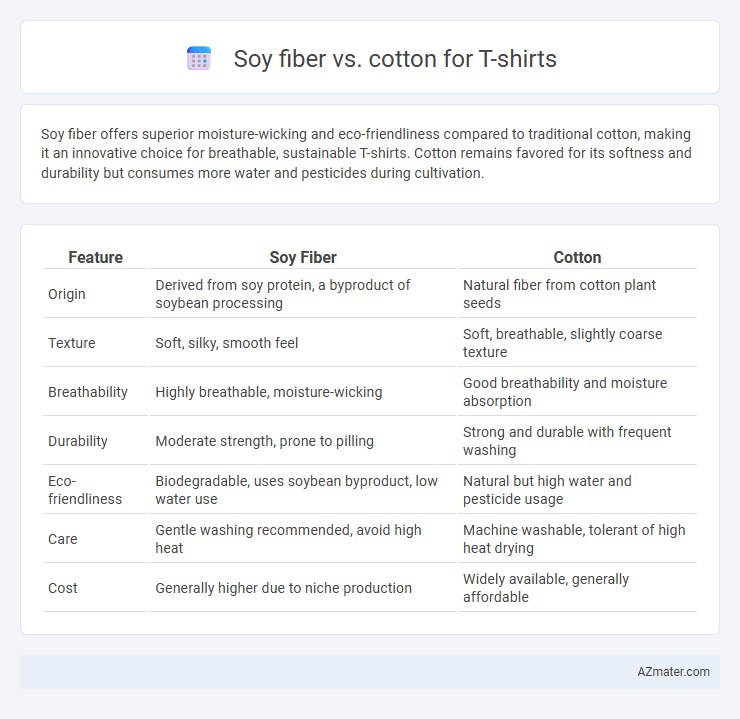Soy fiber offers superior moisture-wicking and eco-friendliness compared to traditional cotton, making it an innovative choice for breathable, sustainable T-shirts. Cotton remains favored for its softness and durability but consumes more water and pesticides during cultivation.
Table of Comparison
| Feature | Soy Fiber | Cotton |
|---|---|---|
| Origin | Derived from soy protein, a byproduct of soybean processing | Natural fiber from cotton plant seeds |
| Texture | Soft, silky, smooth feel | Soft, breathable, slightly coarse texture |
| Breathability | Highly breathable, moisture-wicking | Good breathability and moisture absorption |
| Durability | Moderate strength, prone to pilling | Strong and durable with frequent washing |
| Eco-friendliness | Biodegradable, uses soybean byproduct, low water use | Natural but high water and pesticide usage |
| Care | Gentle washing recommended, avoid high heat | Machine washable, tolerant of high heat drying |
| Cost | Generally higher due to niche production | Widely available, generally affordable |
Introduction: Soy Fiber vs Cotton for T-Shirts
Soy fiber, derived from soybean protein, offers a sustainable and eco-friendly alternative to traditional cotton in T-shirt manufacturing. Cotton, widely known for its breathability and softness, is resource-intensive, requiring significant water and pesticide use during cultivation. Choosing soy fiber T-shirts provides benefits like natural moisture-wicking, biodegradability, and a lower environmental footprint compared to conventional cotton fabric.
Overview of Soy Fiber: Origin and Production
Soy fiber, derived from the byproducts of soybean processing, is an eco-friendly and sustainable alternative to traditional textile fibers, boasting natural antibacterial properties and exceptional softness. The production involves extracting protein from soybean waste, which is then spun into a smooth, breathable fiber ideal for comfortable T-shirts. Unlike cotton, which requires extensive water and pesticide use, soy fiber promotes reduced environmental impact while maintaining durability and moisture absorption.
Cotton: Traditional Choice for T-Shirts
Cotton remains the traditional choice for T-shirts due to its natural breathability, softness, and durability, making it ideal for everyday wear. It efficiently absorbs moisture, keeping the skin dry and comfortable, which is essential for active lifestyles and warm climates. Compared to soy fiber, cotton offers superior strength and resilience, ensuring longer-lasting garments with less pilling and shrinkage.
Fabric Feel: Comfort and Texture Comparison
Soy fiber offers a smooth, silk-like texture that feels exceptionally soft and breathable against the skin, promoting comfort in T-shirt wear. Cotton provides a natural, slightly textured feel known for its durability and moisture absorption, ensuring lasting comfort throughout the day. Comparing comfort and texture, soy fiber excels in softness and lightweight breathability, while cotton stands out for its robust, familiar fabric feel and moisture control.
Breathability and Moisture Management
Soy fiber T-shirts offer superior breathability due to their unique porous structure, which allows for enhanced air circulation compared to traditional cotton. Moisture management in soy fiber is highly efficient as it naturally wicks away sweat, promoting faster drying and maintaining comfort during physical activity. Cotton, while breathable, tends to retain moisture longer, making soy fiber a preferable choice for activewear focused on temperature regulation and sweat control.
Durability and Longevity of Soy Fiber vs Cotton
Soy fiber offers remarkable durability, maintaining fabric integrity longer than conventional cotton due to its natural resilience and resistance to pilling. Cotton, while breathable and soft, tends to wear down faster with frequent washing and exposure to sunlight, leading to fraying and color fading. The longevity of soy fiber T-shirts surpasses cotton in retaining shape, strength, and appearance, making it a superior choice for long-lasting apparel.
Eco-Friendliness and Sustainability Factors
Soy fiber, derived from soybean protein, offers superior eco-friendliness due to its biodegradable nature and minimal agricultural chemical use compared to conventional cotton cultivation, which often requires extensive water, pesticides, and fertilizers. Cotton's high water consumption and soil degradation contribute to sustainability challenges, whereas soy fiber production benefits from utilizing agricultural by-products, reducing waste and promoting circular economy principles. The renewable and compostable attributes of soy fiber make it a more sustainable choice for T-shirts aiming to minimize environmental impact and support eco-conscious fashion.
Cost Comparison: Soy Fiber T-Shirts vs Cotton
Soy fiber T-shirts generally have a higher production cost than cotton due to limited raw material availability and specialized processing techniques. Cotton T-shirts benefit from established large-scale farming and manufacturing infrastructure, resulting in lower prices and broader market accessibility. Despite the initial cost difference, soy fiber offers eco-friendly properties that may justify its premium price for environmentally conscious consumers.
Allergenicity and Skin Sensitivity Considerations
Soy fiber offers hypoallergenic properties that make it suitable for individuals with sensitive skin or allergies, reducing the risk of irritation compared to conventional cotton. Cotton, while breathable and soft, may sometimes cause mild allergic reactions or skin sensitivity in certain individuals due to residual pesticides or chemical treatments. Choosing soy fiber T-shirts can provide a gentler option for those prone to skin discomfort, promoting comfort and minimizing allergenic responses.
Which Is Better for T-Shirts: Soy Fiber or Cotton?
Soy fiber offers superior softness and moisture-wicking properties, making it ideal for comfortable, breathable T-shirts. Cotton provides durability, excellent breathability, and is widely preferred for its natural, hypoallergenic qualities. For a balance of comfort and environmental benefits, soy fiber blends are emerging as a strong alternative to traditional cotton in T-shirt production.

Infographic: Soy fiber vs Cotton for T-shirt
 azmater.com
azmater.com